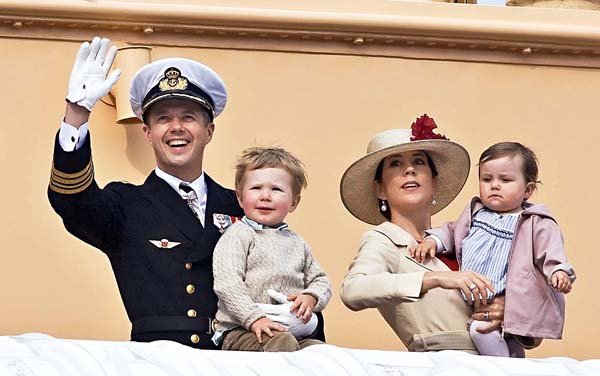Michael Borg-Hansen, the Danish ambassador to Ukraine, is not a newcomer to Eastern Europe.
Having served at various posts abroad, including Moscow, Washington and London and as adviser for the then Prime Minister Anders Fogh Rasmussen, he based himself in Ukraine in 2009 to serve as ambassador for Ukraine, Georgia and Armenia.
While Denmark is a tiny nation of less than 6 million people, its government ranks high for respect of rule of law and transparency.
Borg-Hansen said his work in Ukraine includes defending Danish businesses against corruption and bureaucracy.

Crown Prince Frederik and Princess Mary, and children Christian and Isabella in 2009. (Courtesy)
Kyiv Post: Denmark is a very developed country, both politically and economically. How does having your monarchy fits into this equation?
Michael Borg-Hansen: Monarchy itself has very little political meaning, but if the monarch enjoys popularity among people, he or she becomes the “moral voice” in the country and the symbol of Denmark abroad.
It’s the case with our queen, Margrethe II, now and her eldest son, Crown Prince Frederik, who has been voted the most popular man in the country and also looked up to in Greenland and the Faroe Islands.
The queen holds one very public speech on the eve of the New Year. Of course, the draft of the speech is written by the government, but she adds her personal touch to it. It the last one she has been quite frank about immigration.
She encouraged Danes to treat people who come to our country well and respect their culture.
KP: Has immigration been a big problem in Denmark lately?
MH: It has been a very politically challenged question for the last decade. Originally, we accepted some immigration from Turkey and Yugoslavia for the purpose of more labor force.
There are some refugees from Vietnam who came also. Many of these people came from different cultural backgrounds and didn’t want to integrate – accept the norms and rules of the country you choose to move to.
They formed their own groups within society with their own rules and didn’t want to become parts of Danish society.
And people reacted strongly against that. Denmark is a very small country, culturally very homogeneous. Until this exotic element turned up, you would have 5 million people with the same religion with the same traditions, even looking physically the same.
Therefore people were very concerned when they observed these tendencies. The reaction was quite strong.
KP: How about the Ukrainian immigrants in Denmark, do they cause problems?
MH: Ukrainians fit fine into the society; they integrate very well. The Ukrainian group is big enough to have formed an association and they unveiled a bust of Taras Shevchenko in one of the parks in Copenhagen recently. We also have up to 2,000 young Ukrainians coming as agricultural trainees to Denmark each year.
They learn not only how to organize production on a farm, but also how to run a business. Coming back to Ukraine, I saw some of them working at the Danish pig farms.
Very often they go directly into middle management and maybe in 10 years, they will take over of some these businesses.
KP: How about the Danes in Ukraine, what do they do here?
MH: There is less than 100 Danes registered at the embassy, but there might be another 100 staying here.
The Danish element here is concentrated in the western Ukraine, where they run all sorts of businesses: Information technology, textile, furniture, pig farms.
KP: While there are more than 100 Danish companies in Ukraine, you don’t stand on the top list of Ukraine’s investors. Why is that?
MH: Typical Danish companies are middle-sized and invest in narrow market niches. Also, unlike other countries that have been in this region for centuries, Danish investors are relatively new ones.
KP: Many foreign investors complain that it’s very hard to run small businesses in Ukraine. Yet Danes somehow manage it well. What’s the secret?
MH: They, of course, are very resilient, but also rather flexible.
KP: What are the problems that they run into?
MH: They run into well known gluttony of bureaucracy, where way too many officials create way too many licenses and papers that needs to be filled out.
I’ve seen in Georgia, which I’ve covered as ambassador also from here, how one can cut down red tape and fight corruption. It hasn’t happened in Ukraine.
As an ambassador, I try to help out those businesses by meeting with customs and tax authorities and discussing concrete cases, encouraging them to improve their record.
The rules in the country are not strong enough that one can rely on them; it’s still all about personal influence. I’m happy with the results of my work though and it’s far more exciting for me to work in Ukraine than inside of the European Union because I really could make a difference.
KP: What would make it easier for Danish investors to work in Ukraine?
MH: Well, it’s not a big mystery what has to be done – reforms should be implemented, transparency should be the rule of the day, there has to be an even play field for everybody.
| Denmark, the smallest of the Scandinavian countries wants to base its energy consumption only on renewable forms of energy by 2050. Area: total: 43,094 square kilometers Source: CIA World Factbook and the Danish Embassy in Ukraine |
Read also ‘Danes small in number, but big in influence on Ukraine‘.
Kyiv Post staff writer Katya Grushenko can be reached at [email protected].
